Martin Edwards's Blog, page 107
July 3, 2019
Exploring Lorac Country

Last week I spent a fascinating day exploring the area where Carol Rivett, alias E.C.R. Lorac and Carol Carnac, lived for the last fifteen years or so of her life. This is Lunesdale in north Lancashire, an area that is - in comparison at least to the much-visited hot spots of the Lake District - somewhat off the beaten track, yet a very appealing area of the English countryside. The photo above is of Crook O'Lune - which supplied the title for one of Lorac's novels.
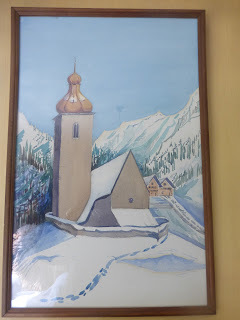
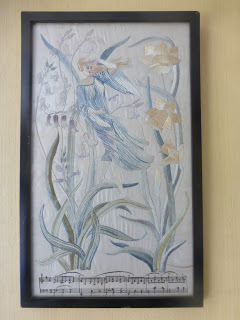
My guide was someone who actually knew Carol Rivett well, and who features as a minor character in one of her books. I learned a great deal from her, not least that Carol was a strong-minded woman with many talents. I had the chance to admire some of her artwork, embroidery, and calligraphy; she was also an accomplished musician, who taught the piano prior to the Second World War. I also learned something I hadn't realised before, that her output included a novel for children called Island Spell.


Carol moved to Lunesdale during the war, in the early 1940s, to be close to her sister Maud and her brother-in-law. The family was very close; there was a third sister, Gladys, and although she lived in London, all three sisters are buried in the churchyard at Aughton (pronounced "Afton", and not to be confused with Aughton near Ormskirk) where Carol lived. We went on a pilgrimage there, and also to the neighbouring houses where Carol and her in-laws lived.

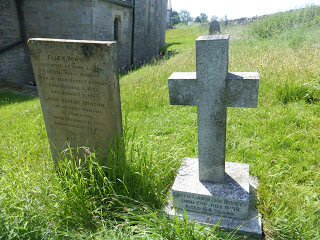
Whilst walking around the area - some of the narrow and bumpy rural lanes are not ideal for driving! - by chance we bumped into someone who lives in another house nearby which features in one of the Lorac books. She put a lot of her experiences (and people she knew) into her books, and it was a pleasure to be able to see them for myself. It's a lovely part of the world, and I can see why she was happy to live there. And I wondered what she would have made of the enthusiasm which has greeted the British Library's recent reprints of her work - with another title, Fell Murder, which is set in Lunesdale, due out next month.
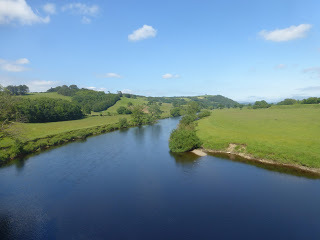
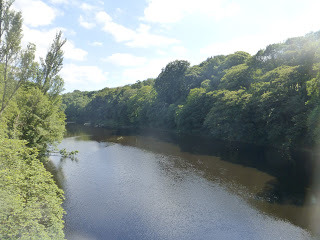
Published on July 03, 2019 06:18
July 1, 2019
Bodies from the Library 2019
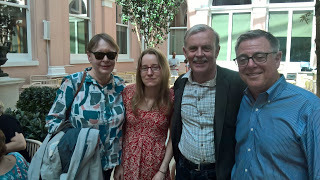
I doubt I was the only person who was surprised to be reminded that Saturday's Bodies from the Library conference was the fifth to be held. What a five years it has been for lovers of classic crime fiction! How vividly I still recall my first chat over coffee with Rob Davies (a welcome attendee on Saturday, even though he has now left the BL) and his suggestion that I write a couple of intros for forthcoming novels by John Bude, as well as my telling him that I was just about to conclude work on a manuscript about "the golden age of murder".....
The programme for the day was packed but well-organised and as ever I'd like to congratulate all those who worked so hard to make the day a success. I was on a flying visit to London, but Moira Redmond of the Clothes in Books blog had invited me to join a small gathering for tea at the Wallace Collection, and this proved a convivial occasion, at which I had the pleasure of meeting Brad Friedman, a blogger based in San Francisco, who was over in the UK for a few days. (Moira took the photo above, of Christine Poulson, Kate Jackson, Brad and me). We even did a bit of book shopping in Charing Cross Road before heading over to Euston for a meal with the Bodies team, David Brawn of HarperCollins, and a number of other friends.
Because it's such a busy day, there's never as much time to socialise as would be ideal, but it was good to see the likes of Nigel Moss, Barry Pike, and Geoff Bradley during the breaks. I enjoyed listening to the various talks, including one by Sarah Ward about E.C.R. Lorac which was very timely given that earlier in the week I'd been on a trip to Lorac's country - about which, more another day.
There was a live performance of "Sweet Death", a radio play by Christianna Brand, which worked very well, and I was interested to learn more about June Wright, an author about whom I knew nothing, from Kate Jackson. I was interviewed by Christine Poulson about Cyril Hare, and there was also an enjoyable session at the end of the day when the speakers answered questions posed by audience members. Great fun.
Published on July 01, 2019 02:30
June 28, 2019
Forgotten Book - Stalemate
Two men, each of them burdened by a wife who is no longer loved, but who refuses a divorce. How can they rid themselves of the inconvenience, and make the most of life. The two men do have a slight acquaintance, but it isn't widely known. They confide in each other, and one of them has an idea. Why don't they help each other out, by killing each other's wives?
Sounds familiar, doesn't it? This is an idea that has cropped up in crime stories time and again over the year. Of all the variations on the theme, Patricia Highsmith's Strangers on a Train is by far the most renowned, though other good examples have been produced by the late Sheila Radley and the American thriller writer Peter Swanson. The book I'm referring to, however, is Stalemate. It was written by Evelyn Berckman, an expatriate American based in London, and published here in 1966.
My interest in Berckman was fired when I watched a film based on one of her books, Do You Know this Voice? It prompted me to acquire some of her other novels. And although the premise of Stalemate isn't original, it's handled in a fairly original way. The key twist is foreseeable, but it becomes clear by the end of the book that Berckman's interest is in character rather than puzzling her readers. And she is pretty good at characterisation.
I was particularly impressed by the quality of the writing in the first half of the book. Berckman has a pleasing turn of phrase, and there's an intensity about her prose which is appealing. In the later stages, there are one or two scenes which are perhaps over-wrought, and I was slightly surprised by the way she shifts focus from the main actors in the drama to a member of the supporting cast. So despite its familiar premise, it' becomes quite an unusual story. Not a masterpiece in the Highsmith class, but interesting.
Sounds familiar, doesn't it? This is an idea that has cropped up in crime stories time and again over the year. Of all the variations on the theme, Patricia Highsmith's Strangers on a Train is by far the most renowned, though other good examples have been produced by the late Sheila Radley and the American thriller writer Peter Swanson. The book I'm referring to, however, is Stalemate. It was written by Evelyn Berckman, an expatriate American based in London, and published here in 1966.
My interest in Berckman was fired when I watched a film based on one of her books, Do You Know this Voice? It prompted me to acquire some of her other novels. And although the premise of Stalemate isn't original, it's handled in a fairly original way. The key twist is foreseeable, but it becomes clear by the end of the book that Berckman's interest is in character rather than puzzling her readers. And she is pretty good at characterisation.
I was particularly impressed by the quality of the writing in the first half of the book. Berckman has a pleasing turn of phrase, and there's an intensity about her prose which is appealing. In the later stages, there are one or two scenes which are perhaps over-wrought, and I was slightly surprised by the way she shifts focus from the main actors in the drama to a member of the supporting cast. So despite its familiar premise, it' becomes quite an unusual story. Not a masterpiece in the Highsmith class, but interesting.
Published on June 28, 2019 15:53
June 26, 2019
Writing "The Sound of Secrecy"
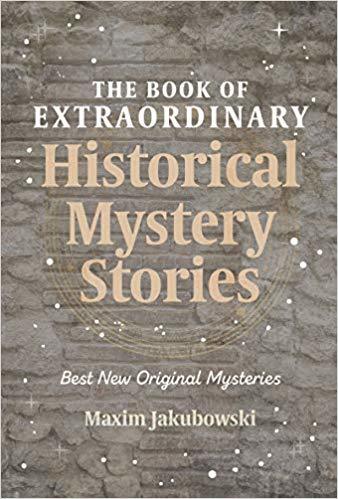
I've published a couple of new short stories recently. "The Girl on the Bandwagon" appeared in Ellery Queen's Mystery Magazine, and no prizes for guessing which branch of crime fiction it seeks to satirise! "The Sound of Secrecy" is to be found in a new anthology, The Book of Extraordinary Historical Mystery Stories, published by Mango and edited by Maxim Jakubowski.
I came across the term "the sound of secrecy" last year, on a visit to Bletchley Park. It stuck in my mind, and I felt the urge to write a story about the war-time codebreakers of Bletchley. I had the beginnings of an idea, but it stubbornly refused to develop, which was frustrating.
Then Maxim announced the proposed publication of his book, and it sounded very appealing. Maxim has edited more than eighty anthologies, that is, more than twice as many as me, and he shares my love of the short story. In the past, he's included a number of my efforts in his books, and I told myself that the Bletchley Park story might find a very good home, if only I could breathe some life into it.
The answer arrived unexpectedly. Last autumn, I went to St Helier to take part in a literary festival in Jersey, and had a little spare time, which enabled me to take a trip to Gorey and its splendid harbour and castle. Quite an inspirational place. Suddenly it struck me how I could write a story which shifted between wartime in Bletchley Park and the relatively recent past in Jersey. It was like finding a key to unlock a door.
Luckily for me, the story worked, and Maxim accepted it. I'm delighted to see "The Sound of Secrecy" appearing in his book alongside a host of good writers such as Sally Spedding, Kate Ellis, Linda Stratmann, Amy Myers, Jane Finnis, Michael Bracken and Paul Magrs.
Published on June 26, 2019 15:05
June 24, 2019
Alibis in the Archive 2019
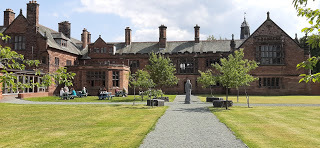
Over the past weekend, I've been at Gladstone's Library, hosting the third Alibis in the Archive conference. As before, this was a celebration of crime fiction, and its heritage, in a gorgeous setting made all the better by good weather. The Library is home to the British Crime Writing Archives, the collections of the Crime Writers' Association and the Detection Club, and the Library's head archivist had arranged a marvellous display of some of the items from the collection.
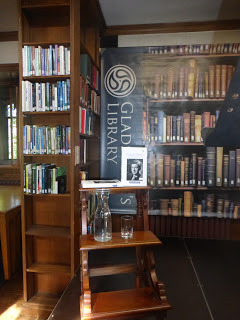
The programme began on Friday with dinner and a library-based version of a "pub quiz". I was question master, the first time I've done such a thing. It was a lot of fun, with book prizes generously donated by HarperCollins. And it was a good way for attendees to get to know the writers who had come along for the weekend. There's a lot of mingling at Gladstone's. It's such a friendly place and that's the ethos of the Alibis conference.
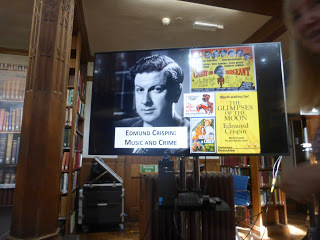
On Saturday morning, David Whittle kicked off the series of talks with a lovely discussion about Edmund Crispin, interspersed with recordings of some of the music Crispin wrote, under his real name Bruce Montgomery. Then Alison Joseph gave a thought-provoking talk about the books Agatha Christie wrote as Mary Westmacott.
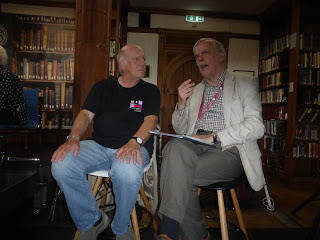
Many people had come along specially to hear Peter Robinson, and he did not disappoint, with a frank and fascinating talk about his crime writing career and the experience of seeing his DCI Banks series televised. It was quite riveting, and so was Frances Fyfield's personal and moving account of a literary friendship, between her and P.D. James.
After lunch came Aline Templeton (whose husband Ian took some of these photos), with a wide-ranging survey of Scotland's contribution to the crime genre, from James Hogg onwards, and Michael Ridpath, talking about the settings of his books. I finished off the day's formal programme, with a talk about Julian Symons and Michael Gilbert, and brought along a collection of books by both men to illustrate it. Several people were intrigued by Julian's particularly modest way of inscribing his work. The evening was also memorable - many of us sat outside, talking over a glass of wine or two, enjoying the long hours of daylight.
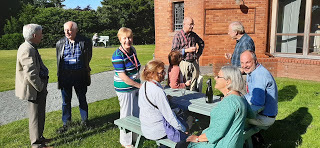
Sunday saw a talk by Janet Laurence about women and crime writing, a conversation between Peter and me, and then a panel discussion involving the whole group of writers to round things off. It was all over too soon, and feedback was extremely positive. And the good news is - Alibis will be back next June! It's a great event and I do hope you'll think about coming along.
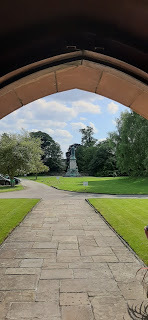
Published on June 24, 2019 03:54
June 21, 2019
Forgotten Book - Obelists Fly High

I first came across the name of C. Daly King in Julian Symons' Bloody Murder. Symons was notoriously dismissive of many Golden Age writers, although he admired Anthony Berkeley and Agatha Christie, and he clearly had a sneaking affection for King's work. I think he recognised that although King's stories were usually quite barmy and riddled with flaws of various kinds, there was something breathtaking and at times admirable about the sheer outrageousness of his use of the tropes of the classic whodunit. My feelings are much the same.
Symons felt, and again I agree, that King's most notable novel was Obelists Fly High. When introducing a 1980 reprint for Collins Crime Club (which had published several of King's books - first editions are rare and much sought-after by collectors; the jacket image comes from Mark Sutcliffe's site), he summed it up as "one of the most extraordinary detective puzzles of the twentieth century". It was the third of the "obelist" books, each of which involved a bizarre killing aboard a particular form of transportation: the first as on board ship, the second on a transcontinental express, and this one on an aeroplane.
There are three diagrams, one of them a plan of the plane. Then comes a "schedule of reported movements" of the passengers, because this is one of those books where timings and whereabouts of suspects are key. And finally there is a "schedule of actual movements", whose contents are naturally rather different. But there is more. The book begins with an epilogue. And it ends with a prologue. King was one of those writers who played games with the structure of the whodunit, and I'm sure Borges would have approved.
There is also a "cluefinder", a device I really love. Basically, it ties in with the idea of "fair play" in detection, and highlights clues in the text that the reader may have missed. It's sometimes been said that King originated the "cluefinder", which isn't the case, although the example in this book is my favourite. J.J. Connington came up with one before King turned to fiction, and his example was followed by others, including Freeman Wills Crofts. If there was an earlier pioneer of this device than Connington, I'd be interested to know, but I'm not aware of one. (Similarly, whilst other writers have begun their books with an epilogue, has anyone else ended with a prologue as well?)
What of the story? Well, it involves a threat to kill a famous surgeon. Michael Lord, King's series cop, is tasked with guarding the surgeon, but suffice to say that he doesn't make a good fist of it. There is plenty to cringe about in the story, quite apart from Lord's bungling, and King's habit of giving his characters jokey names is especially irksome. He doesn't ramble quite as much as in some other books, but his habit of inserting his own idiosyncratic opinions in his stories is also rather challenging to a modern reader. So it is undeniably a flawed novel. But if you are fascinated by the structure and techniques of the Golden Age mystery, as I am, it is a must-read.
Published on June 21, 2019 02:00
June 19, 2019
Slaughter in Southwold - and Suffolk
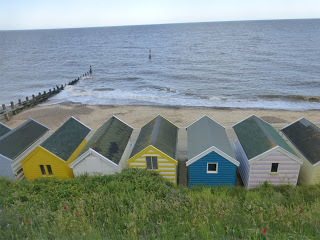
I've just returned from my first proper visit to Suffolk - a county I've only passed through briefly in the past, en route to somewhere else. What a lovely place I've missed... Suffolk was beloved of Ruth Rendell and P.D. James, and features in some of their books, as well as in plenty of other good crime novels. Rendell even published a glossy illustrated guide to the county. Suffice to say that when I was invited to take part in the Slaughter in Southwold Crime Fiction Festival, I accepted very quickly indeed.
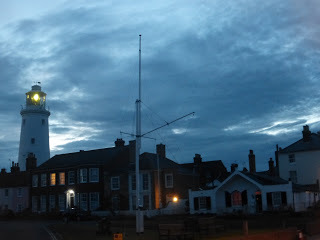
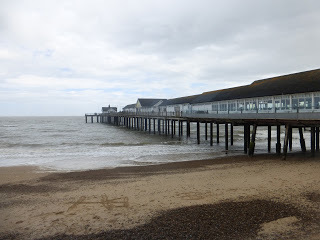
And what a successful festival it was - a huge credit to Charlotte Clark and her willing team, and to Suffolk Libraries, for whom Charlotte works as an executive library manager. She told me that the festival originally began in conjunction with the CWA, a great example of collaboration. Everything was very well-organised, and I bumped into old friends such as Val McDermid, Kate Ellis, Felix Francis, and Mick Herron, as well as having the pleasure of meeting Nicci French (that is, the husband and wife team of Nicci Gerrard and Sean French) for the first time. The attendance was excellent and Beccles Books also did a grand job of selling Gallows Court among other titles.
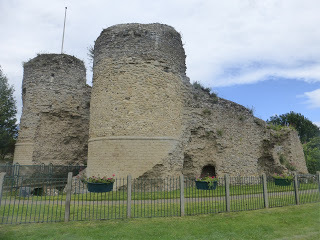
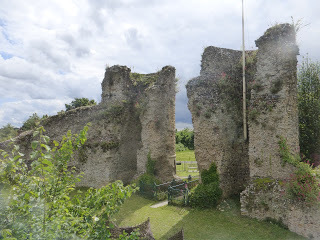
Southwold is a very long way from where I live - roughly a 500 mile return trip that involves some of the most depressingly clogged motorway routes in Europe, so I was determined to make the most of my trip. Suffolk boasts some delightful market towns, several of them with second hand bookshops, and on the way down I stopped off at Bungay, and wandered round the old castle ruins (above) as well as just about resisting the temptation to add to my book collection.
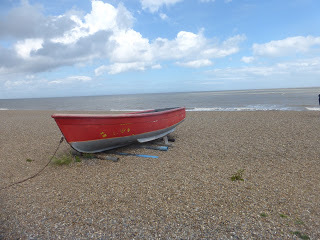
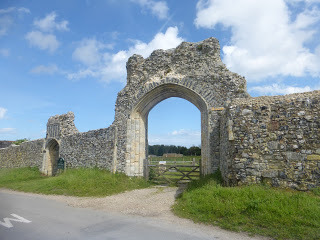
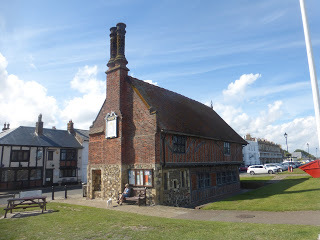
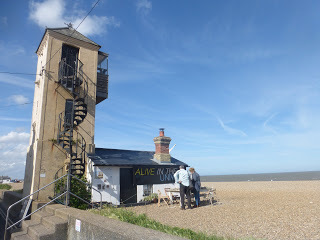
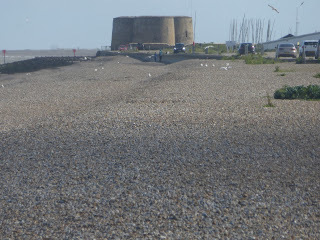
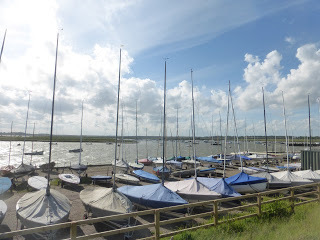
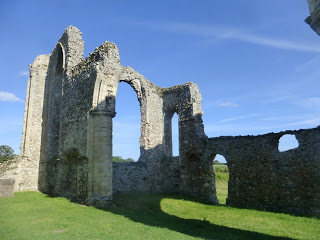
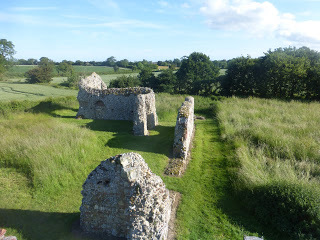
I really enjoyed my first visit to Southwold, a very upmarket little resort, with an inland lighthouse and pretty little beach huts - you can buy one too, if you have £75,000 to spare! I travelled to the equally smart Aldeburgh (above photos of Moot Hall, Martello Tower and marina), just down the coast. Both towns are home to lovely, high calibre independent bookshops which I enjoyed visiting very much. I also made a point of going to Dunwich (above photos of boat on beach and priory gateway), site of a once great port, now lost to the waves; a ruined priory still remains inland. The notion of a lost village, let alone a lost port, has always fascinated me. There was also a chance to take a look at Leiston Abbey (above, lower photos), a very impressive ruin.
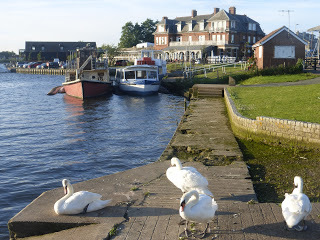
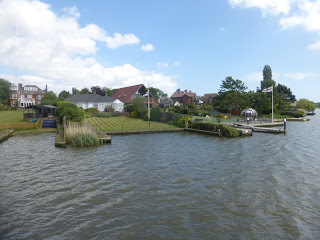
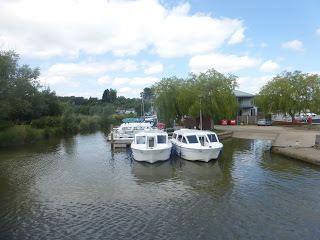
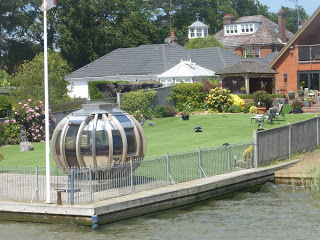
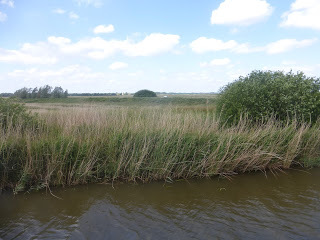
Making my way up the coast, I spent one night at a hotel on the edge of Oulton Broad - I hadn't realised that the Norfolk Broads actually extend into Suffolk. As I was very lucky with the weather, I couldn't resist the lure of a boat trip along the broad, Oulton Dyke, and the River Waveney - a truly delightful experience. I also continued to explore the towns and villages of the area - the likes of Thorpeness (rather close to the nuclear reactor at Sizewell, but very attractive), Burgh St Peter, and Beccles, where I finally succumbed to temptation, having managed to find a couple of inscribed crime novels at yet another second hand bookshop.
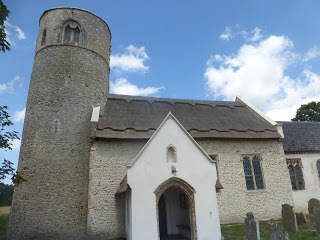
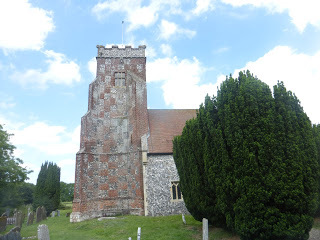
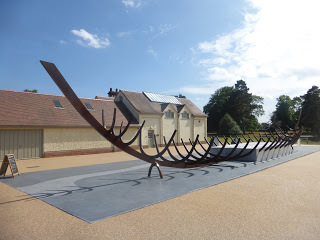
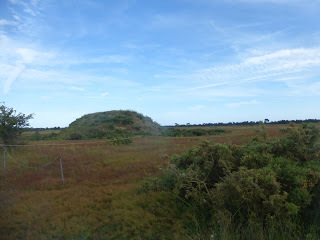
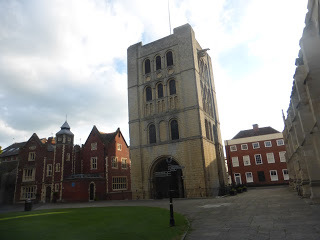
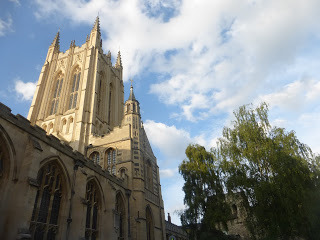
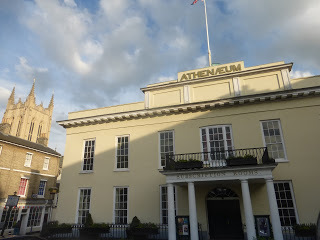
And then it was on to Sutton Hoo, legendary as the site of Anglo-Saxon burials, and pleasantly situated above the River Deben. After that, on to Bury St Edmunds, a cathedral city as charming as Wells which I visited the other week, and dinner with Kate and her husband Roger, who were also doing the tourist thing, having had a similarly long journey.
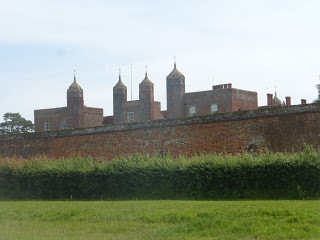
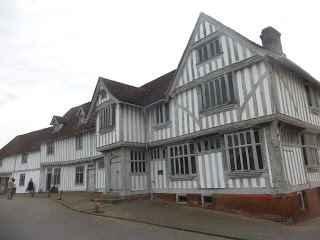
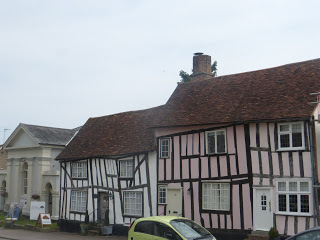
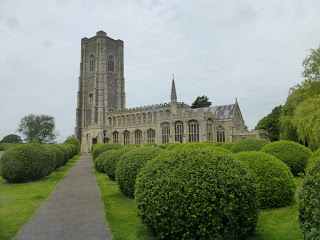
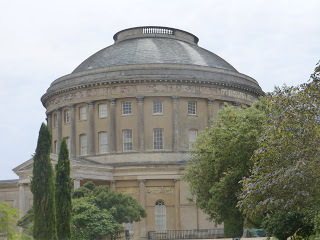
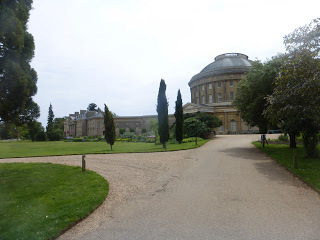
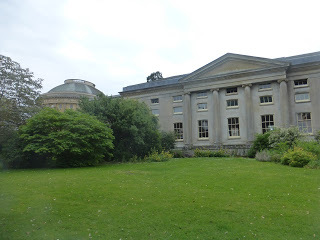
On my last day in Suffolk, I explored the lovely village of Long Melford and then the gorgeous town of Lavenham. They say that Lavenham is England's best-preserved medieval town, and I don't doubt it. The Guildhall in the market place is a National Trust property, well worth visiting. And I decided to fit in one more National Trust visit before returning home. This was to Ickworth, a hugely impressive property. To my astonishment, as I was looking round the rooms, one of the guides addressed me by name. It turned out she's read all my Lake District and Liverpool novels. Believe me, that's not an everyday occurrence! It's hard for me to put into word how gratifying such encounters are. What a marvellous time I had. I'm so grateful to those who helped to make it possible, and to make it so special.
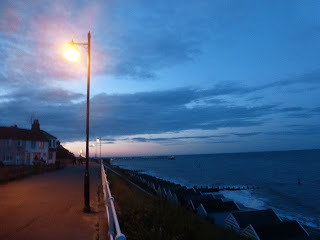
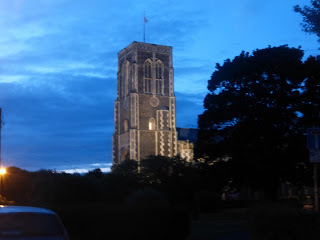
Published on June 19, 2019 12:36
June 14, 2019
Witness for the Prosecution at County Hall
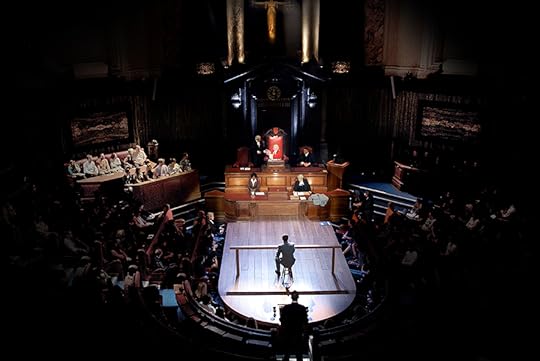
Agatha Christie's Witness for the Prosecution began life as a short story called "Traitor's Hands", written very early in her career (though, for me, it remains the best short story she ever wrote). She adapted it for the stage in 1953, adding an additional plot twist, and an excellent film version followed, directed by the great Billy Wilder and starring Charles Laughton, Marlene Dietrich, and Tyrone Power, four years later. There was a TV version a couple of years ago, while the stage play returned to London's County Hall with great success back in 2017, and it's still going strong.
I was glad to receive an invitation to a Gala performance of the play, held last night, to celebrate the new cast. Because I was down in London for a variety of other events, including a Detection Club dinner (nicely reported by Moira Redmond here) and the annual lunch for past Chairs of the Crime Writers' Association, I was able to accept, and I'm really glad I did. Having been lucky enough to be invited to stay at Agatha's old home in Devon, Greenway, last week, the chance to see the play was a real bonus.
The unique feature of Lucy Bailey's production is the setting - the former debating chamber of the Greater London Council, a magnificent space, and ideally suited for transformation into the Old Bailey. The large cast doesn't contain any major household names, and is none the worse for that. I thought the performances were of a consistently high standard; the actors in the lead roles, Simon Dutton as the defence QC, Carolin Stoltz as Romaine, and Lewis Cope as Leonard, were very good, while the other cast members also performed with conviction. This is a play where the production needs to be slick and fast-paced - and it was. Of course my enthusiasm for Christie is no secret, but I was accompanied by my son, a barrister, who wasn't familiar with the play, and he was impressed. A private party held after the show completed a memorable evening.
I've watched a number of Christie plays over the years, and I've mentioned
I talked in The Golden Age of Murder about Christie's preoccupation with the question of how to do justice, an aspect of her work that was neglected for many years. This play is a very good example of her almost obsessive interest in a subject which is as relevant today as when the original story was first written.
Published on June 14, 2019 15:06
Forgotten Book - Goodbye, Friend
Goodbye, Friend is something of an oddity. It's a short, snappy thriller, and as the author explains at the end, it's not really a novel. Rather, it's a movie script stripped of the directions, so that each of the "chapters" is really just a scene. What makes it interesting is that the author is Sebastien Japrisot. I've discussed his books several times on this blog, and I'm a fan. So when I spotted a cheap second hand paperback edition of this title, despite never having heard of it before, I snapped it up.
The film itself is best known as Farewell, Friend, although an alternate title was Honour Among Thieves. It starred Alain Delon and Charles Bronson, something of an odd pairing, but one that may well have worked on the screen - I've yet to see the film, which was released in 1968, though I'm tempted to seek it out.
Tempted, I have to say, despite the fact that the book version is nothing special. Perhaps this was predictable for a book that's no more than a pretty basic script. The set-up is, however, intriguing. Two men who first encountered each other in the French Foreign Legion meet up again, quite unexpectedly, when both try to rob the same bank. Naturally, things fail to go to plan.
In essence, it's a heist story with a difference, and I can imagine that on the screen it would work well. In book form - hmmmm....It certainly isn't in the same league as Trap for Cinderella or One Deadly Summer, both of which are gripping as well as ingenious, and strongly recommended. But this one is at least mercifully short and, overall, it was worth a quick read.
The film itself is best known as Farewell, Friend, although an alternate title was Honour Among Thieves. It starred Alain Delon and Charles Bronson, something of an odd pairing, but one that may well have worked on the screen - I've yet to see the film, which was released in 1968, though I'm tempted to seek it out.
Tempted, I have to say, despite the fact that the book version is nothing special. Perhaps this was predictable for a book that's no more than a pretty basic script. The set-up is, however, intriguing. Two men who first encountered each other in the French Foreign Legion meet up again, quite unexpectedly, when both try to rob the same bank. Naturally, things fail to go to plan.
In essence, it's a heist story with a difference, and I can imagine that on the screen it would work well. In book form - hmmmm....It certainly isn't in the same league as Trap for Cinderella or One Deadly Summer, both of which are gripping as well as ingenious, and strongly recommended. But this one is at least mercifully short and, overall, it was worth a quick read.
Published on June 14, 2019 05:00
June 12, 2019
The Greenway Literary Festival trip
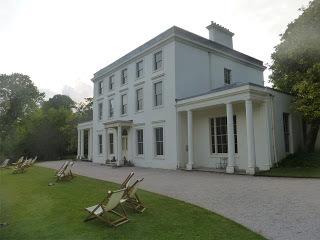
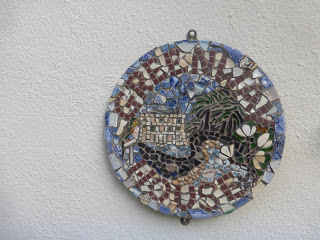
June 4 saw the tenth anniversary of the National Trust coming into possession of Greenway House, the house in south Devon which was the home of Agatha Christie and her family from the late 30s onwards. When I was invited to take part in a literary festival there, and to talk about crime fiction on the anniversary date, I was delighted, and the pleasure was doubled when I was offered the opportunity to stay overnight in Greenway itself. No Christie fan would think twice about accepting, and I certainly didn't hesitate to say yes.
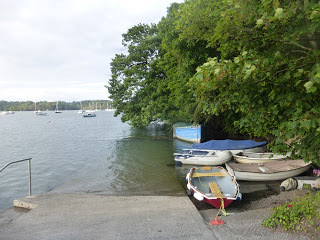

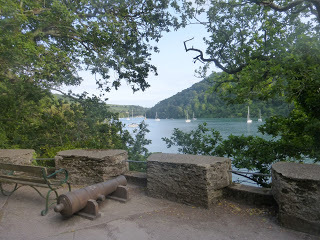
I first visited Greenway back in 1990, when Rosalind Hicks, Agatha's daughter, hosted a small visiting party of crime writers at the time of her mother's centenary. I returned many years later in the company of John Curran, but this time I had the wonderful experience of roaming the lovely grounds when all the crowds had gone on a delightful June evening as well as of staying in the house. The National Trust people looked after us very well, I must say. It was truly memorable and I acquired a couple of Greenway plants for my garden as souvenirs...
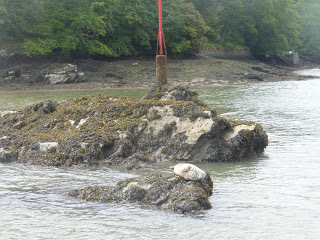
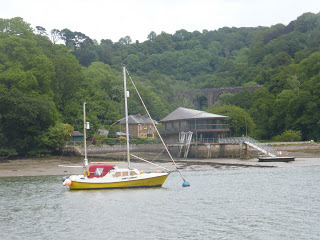
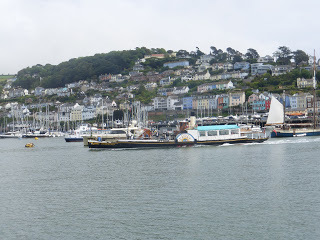
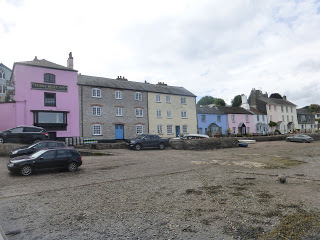
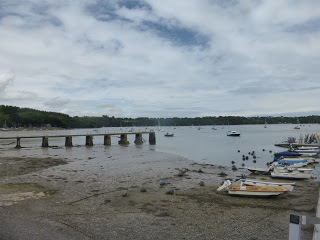
After I'd given my talk the following morning, we headed off on the ferry to Dartmouth, along the river Dart, and then did the short hop across to Dittisham and back (I now know where Agatha found the name for Lady Dittisham, of Five Little Pigs....) Because south Devon is a very long way from Cheshire, I decided to turn the trip into a tour of the south west. It seems to me to make sense, whenever possible, to turn event appearances into touring experiences, a chance to see a different part of the world as well as to meet crime fans. And it makes one feel better when sitting in endless traffic on the motorway when finally heading back home...
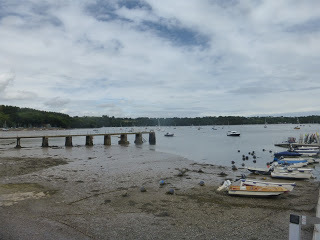

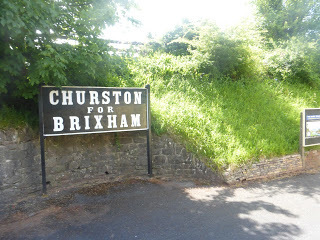
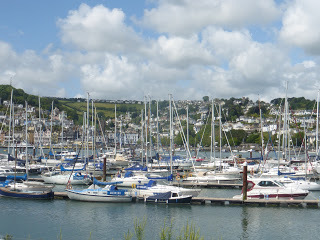
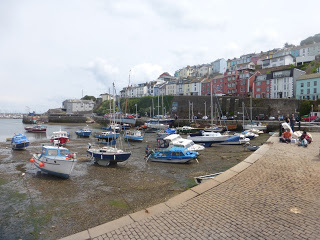
We had the chance to catch up with some friends who now live in the delightful cathedral city of Wells, and also stayed for a night in the resort of Paignton. The prospect of a return journey on the steam train that runs from Paignton to Kingswear, across the water from Dartmouth, which passes by Greenway, proved irresistible. I suspect the train was the original of the train which provides a clue in Taken at the Flood. A visit to Brixham, which I last saw as a child, surprised me: I had no idea it was a place of such historical importance. And it's very pretty too. Nearby Churston Manor, which proved to be an atmospheric lunch venue, is in the village of Churston, which features in The ABC Murders.
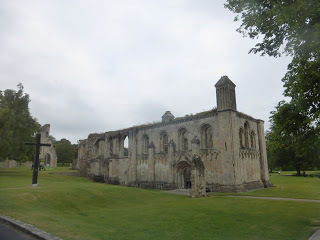

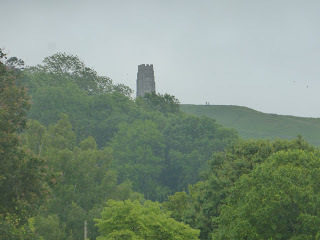
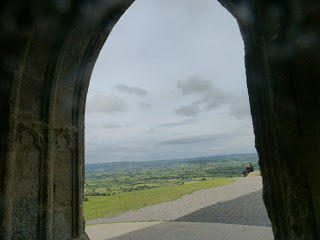
Among other highlights in Somerset were a climb up to the top of Glastonbury Tor, a trip around Glastonbury Abbey (said to be the birthplace of King Arthur, among much else), and a visit to Bath, a city I've long been fond of, as well as to Totnes and Dartmouth (the original of Kate Ellis' Tradmouth) in Devon. All in all, a terrific experience. I just need to get a bit of writing done before I set off again...
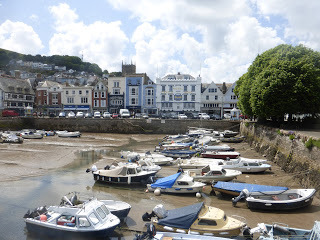
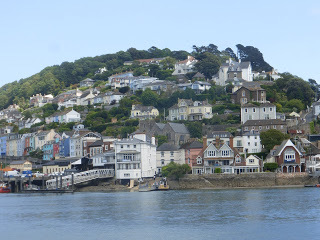
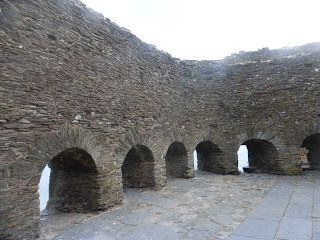
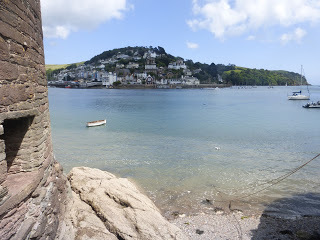
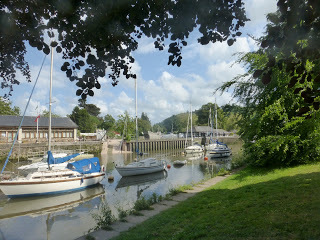
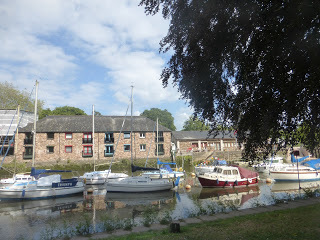
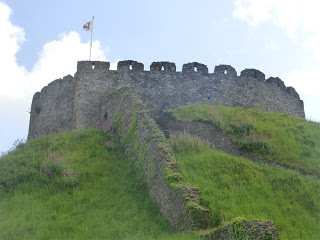
Published on June 12, 2019 01:00



